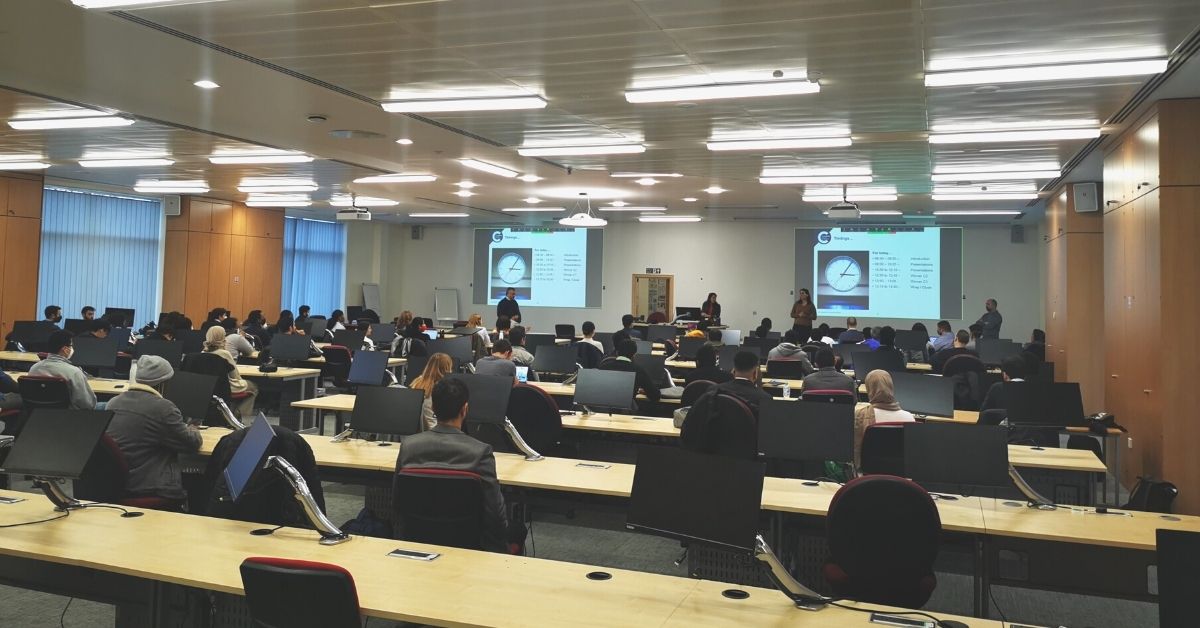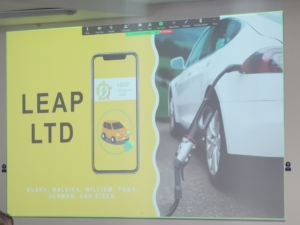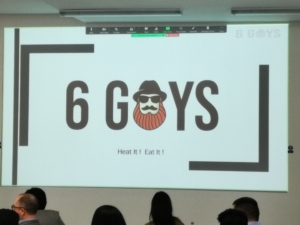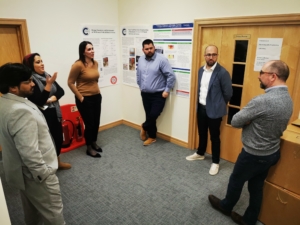A view from inside the Energy Entrepreneurship module
23/05/2022

I’m Wayne Coulter, Marketing Manager in the School of Water, Energy and Environment here at Cranfield University. As part of my job I work with our students to produce content that tells the story of student life at Cranfield. Ranging from written testimonials that appear on our course web pages or brochures, or video testimonials that we publish on our social media channels. We also encourage students to get involved with our webinars, social media takeovers, and a whole host of other exciting activities to enrich their experience and help raise their profiles ready for when they finish their studies and embark on their next chapter. One such activity is writing a blog, which is why I am here.
I’d like to share a recent experience I had attending one of our Energy and Power modules on MSc Renewable Energy, one of our most popular MScs. The ‘Energy Entrepreneurship’ module is delivered in collaboration with colleagues from The Bettany Centre within the Cranfield School of Management and gives our students the perfect opportunity to explore skills and techniques that they maybe didn’t consider they would learn, or in fact, need on an Energy and Power course.
My role in attending the final day of the module was to gather student testimonials, covering what they most enjoyed, what they considered to be entrepreneurship, and any key learnings they’d be taking away. The room was a hive of activity. Many of the students we spoke to shared reservations that they’d had about the module before it started – possibly not knowing what to expect, or why it was relevant, but every single person who had these reservations was amazed by the whole experience and had their opinion totally reversed during the module itself, thoroughly enjoying the time they spent learning these valuable skills.
The final day involved the students working in groups to present a business idea that they had developed during the two-week module. There were two options; Peer-to-peer Electric Vehicle (EV) charging, or Renewable Energy-powered barbecues.

Each group, comprising 5-6 students had worked on their chosen idea in the run-up to this presentation day – looking at their venture strategy, financing, intellectual property, risk, performance and evolution, alongside the physical engineering of the product/idea itself and my favourite subject – marketing. Now it’s worth mentioning at this stage that the Renewable Energy MSc has two routes – an Engineering route and a Management route, you’ll see why I mention that in just a second…
The presentations were then conducted in a ‘Dragon’s Den’ style to a panel of experts from industry and academia, including entrepreneurial specialists. Due to the size of the cohort, the group was split into two presentation rooms, each with around five groups. My colleague and I moved from one room to the other during the breaks and it was really interesting to see the difference in presentation and questioning in the two rooms. Students were encouraged to participate in the cross-examination part of the presentations and, true to form, the Engineering route students focused on the physical properties and performance, whilst those on the Management route concentrated on asking questions about financial and marketing related aspects.
There could only be one winner of course, and after the first round, one finalist was selected from each room. Quite coincidentally we ended up with a finalist from each of the two product types;

Representing peer-to-peer EV charging was ‘Team Leap’ – whose well put together, and well-researched presentation showed the real potential of how the idea of peer-to-peer charging could work, and some of the challenges that would be faced.
In the Renewable Energy-powered barbecue corner was ‘Team 6Guys’ (who had my vote because their logo incorporated a bearded guy – and I have since volunteered my services as their brand ambassador) who presented their solar-powered barbecue.
Both teams had polished their presentations since the first round and they both gave a great performance –answering some quite delving questions from the floor.

Once they had finished, the judges locked themselves away in a room to deliberate and after much deliberation, they decided on a winner, and that winner was…
Team 6Guys!
Both ideas were deemed to have real commercial potential, and the opportunity still exists for the teams to work on the technology with our Energy and Power academics and with colleagues in the School of Management to help develop the business ideas and potentially seek funding.
All in all, it was a real eye-opener for me, and a great opportunity to see our passionate and talented students given real-world experiences and the potential to take things beyond their time with us.
Categories & Tags:
Leave a comment on this post:
You might also like…
Introducing… Bloomberg Trade Flows
Are you interested in world trade flows? Would it be useful to know which nations are your country's major trading partners? If so, the Bloomberg terminal has a rather nifty function where you can view ...
Cranfield alumni voyage to the International Space Station
Seeing our alumni reach the International Space Station (ISS) has a ripple effect that extends far beyond the space sector. For school students questioning whether science is “for them”, for undergraduates weighing their next ...
From classroom to cockpit: What’s next after Cranfield
The Air Transport Management MSc isn’t just about learning theory — it’s about preparing for a career in the aviation industry. Adit shares his dream job, insights from classmates, and advice for prospective students. ...
Setting up a shared group folder in a reference manager
Many of our students are now busy working on their group projects. One easy way to share references amongst a group is to set up group folders in a reference manager like Mendeley or Zotero. ...
Company codes – CUSIP, SEDOL, ISIN…. What do they mean and how can you use them in our Library resources?
As you use our many finance resources, you will probably notice unique company identifiers which may be codes or symbols. It is worth spending some time getting to know what these are and which resources ...
Supporting careers in defence through specialist education
As a materials engineer by background, I have always been drawn to fields where technical expertise directly shapes real‑world outcomes. Few sectors exemplify this better than defence. Engineering careers in defence sit at the ...






